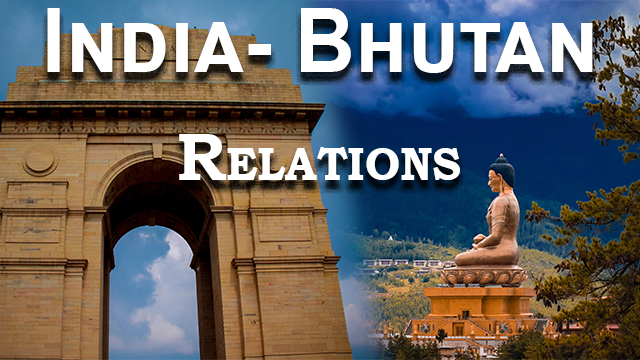India- Bhutan Relations
Bhutan is a strategically important country for India and the defence and security ties between the two sides have witnessed significant expansion in the last few years.
Diplomatic relations between India and Bhutan were established in 1968 with the establishment of a special office of India in Thimphu.
Bilateral ties between India and Bhutan are built on respect, goodwill, and mutual understanding. In 1968, India and Bhutan formally formed diplomatic ties. The Treaty of Friendship and Cooperation, which the two nations signed in 1949 and was renewed in February 2007, serves as the fundamental tenet of ties between India and Bhutan.
Regular high-level interactions between the two nations have strengthened the bilateral relations. India and Bhutan renegotiated their 1949 treaty and penned a new cooperation pact in 2007. The new treaty removed the clause mandating that Bhutan follow India's foreign policy advice and gave Bhutan more freedom to decide whether to import weapons without India's consent.
Trade and Economic Ties
- India is Bhutan’s largest trading partner.
- Bilateral commerce made up 82.6% of all trade in Bhutan in 2020.
- India accounts for more than 77.1% of all shipments into Bhutan.
- The updated bilateral trade, commerce, and transit agreement between India and Bhutan went into force in 2017 and had a ten-year validity period. India allows 16 entry and exit points for Bhutanese trade with other countries (the only exception being China) and had agreed to develop and import a minimum of 10,000 megawatts of electricity from Bhutan by 2021.
Economic Support
Bhutan's top partner for growth is India. India has been providing financial assistance to Bhutan's FYPs ever since the First Five Year Plan of Bhutan was introduced in 1961. For Bhutan's 12th FYP, India had allocated Rs. 4500 billion.
Cooperation in Hydropower:
The foundation of the two countries' economic collaboration is their mutually beneficial hydropower cooperation. The bilateral agreement for cooperation signed in 2006 and its 2009 Protocol address the continuing cooperation between India and Bhutan in the hydropower sector. In operation Bhutan has four hydroelectric projects (HEPs) with a combined capacity of 2136 MW, which are supplying energy to India. 2020 saw the signing of the Concession Agreement for the first Joint Venture Hydro Electric Power Project, the 600 MW Kholongchhu.
Cooperation in education, culture, and cross-cultural interactions:
The Government of India offers more than 950 scholarships each year for Bhutanese students to study in India in a variety of fields such as engineering and medical. Approximately 4,000 Bhutanese are thought to be enrolled in undergraduate programmes at Indian universities on a self-financing premise. Every year, Bhutan has used about 300 slots under the ITEC programme to improve the administrative and technical skills of its government employees and workers in the commercial sector. Buddhist and cultural connections: Bodh Gaya, Rajgir, Nalanda, Sikkim, Udayagiri, and other Buddhist places in India are visited by many pilgrims from Bhutan.
The Importance of Bhutan to India:
Assam, Arunachal Pradesh, West Bengal, and Sikkim are the four Indian States with which Bhutan shares a boundary. Bhutan, a country tucked away in the Himalayas, acts as a stopgap between China and India. For India, the security of Bhutan's current borders, particularly its western border, is crucial. Bhutan serves as a market for Indian goods and is a place where Indian capital is invested. Bhutan is a rich supplier of hydropower for India as well. India values Bhutan's governmental stability. Bhutan's unrest and instability could serve as a haven for militant organisations and anti-Indian activities.
Challenges:
India has interfered with Bhutan's internal matters in the past. Bhutanese people now have a poor opinion of India as a result of this. Bhutan has a growing perception that India's development of Bhutan's hydropower capacity is motivated by personal gain because India benefits from Bhutan's surplus power at comparatively low prices. India has long been concerned about China's persistent claims to key border regions like Chumbi Valley and Doklam, as well as its persistent attempts to build close diplomatic and commercial ties with Bhutan. The original Motor Vehicles Agreement of the subregional Bangladesh-Bhutan-India-Nepal (BBIN) grouping was inked by all four nations in June 2015; however, the Bhutanese parliament declined to ratify the agreement due to objections there regarding sustainability issues.
